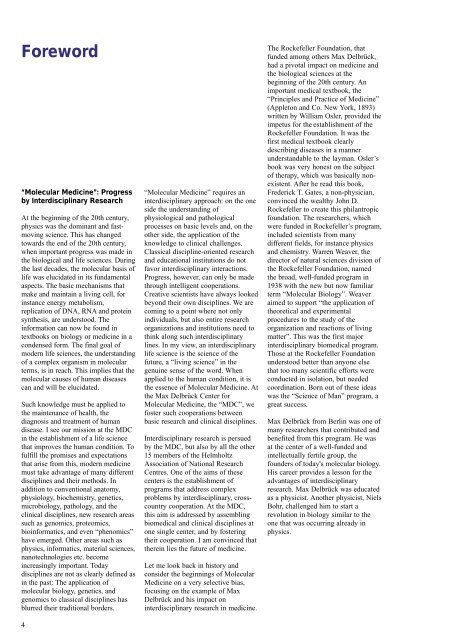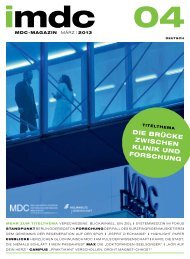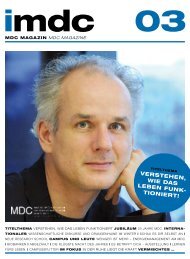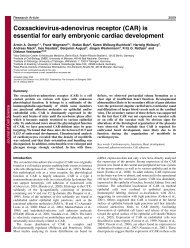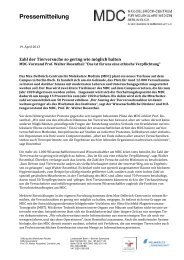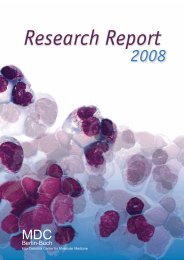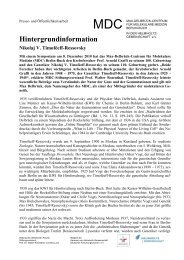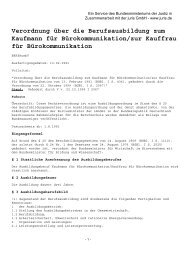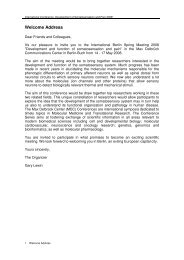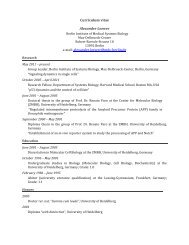You also want an ePaper? Increase the reach of your titles
YUMPU automatically turns print PDFs into web optimized ePapers that Google loves.
Foreword<br />
“Molecular Medicine”: Progress<br />
by Interdisciplinary <strong>Research</strong><br />
At the beginning of the 20th century,<br />
physics was the dominant and fastmoving<br />
science. This has changed<br />
towards the end of the 20th century,<br />
when important progress was made in<br />
the biological and life sciences. During<br />
the last decades, the molecular basis of<br />
life was elucidated in its fundamental<br />
aspects. The basic mechanisms that<br />
make and maintain a living cell, for<br />
instance energy metabolism,<br />
replication of DNA, RNA and protein<br />
synthesis, are understood. The<br />
information can now be found in<br />
textbooks on biology or medicine in a<br />
condensed form. The final goal of<br />
modern life sciences, the understanding<br />
of a complex organism in molecular<br />
terms, is in reach. This implies that the<br />
molecular causes of human diseases<br />
can and will be elucidated.<br />
Such knowledge must be applied to<br />
the maintenance of health, the<br />
diagnosis and treatment of human<br />
disease. I see our mission at the <strong>MDC</strong><br />
in the establishment of a life science<br />
that improves the human condition. To<br />
fulfill the promises and expectations<br />
that arise from this, modern medicine<br />
must take advantage of many different<br />
disciplines and their methods. In<br />
addition to conventional anatomy,<br />
physiology, biochemistry, genetics,<br />
microbiology, pathology, and the<br />
clinical disciplines, new research areas<br />
such as genomics, proteomics,<br />
bioinformatics, and even “phenomics”<br />
have emerged. Other areas such as<br />
physics, informatics, material sciences,<br />
nanotechnologies etc. become<br />
increasingly important. Today<br />
disciplines are not as clearly defined as<br />
in the past: The application of<br />
molecular biology, genetics, and<br />
genomics to classical disciplines has<br />
blurred their traditional borders.<br />
4<br />
“Molecular Medicine” requires an<br />
interdisciplinary approach: on the one<br />
side the understanding of<br />
physiological and pathological<br />
processes on basic levels and, on the<br />
other side, the application of the<br />
knowledge to clinical challenges.<br />
Classical discipline-oriented research<br />
and educational institutions do not<br />
favor interdisciplinary interactions.<br />
Progress, however, can only be made<br />
through intelligent cooperations.<br />
Creative scientists have always looked<br />
beyond their own disciplines. We are<br />
coming to a point where not only<br />
individuals, but also entire research<br />
organizations and institutions need to<br />
think along such interdisciplinary<br />
lines. In my view, an interdisciplinary<br />
life science is the science of the<br />
future, a “living science” in the<br />
genuine sense of the word. When<br />
applied to the human condition, it is<br />
the essence of Molecular Medicine. At<br />
the Max Delbrück Center for<br />
Molecular Medicine, the “<strong>MDC</strong>”, we<br />
foster such cooperations between<br />
basic research and clinical disciplines.<br />
Interdisciplinary research is persued<br />
by the <strong>MDC</strong>, but also by all the other<br />
15 members of the Helmholtz<br />
Association of National <strong>Research</strong><br />
Centres. One of the aims of these<br />
centers is the establishment of<br />
programs that address complex<br />
problems by interdisciplinary, crosscountry<br />
cooperation. At the <strong>MDC</strong>,<br />
this aim is addressed by assembling<br />
biomedical and clinical disciplines at<br />
one single center, and by fostering<br />
their cooperation. I am convinced that<br />
therein lies the future of medicine.<br />
Let me look back in history and<br />
consider the beginnings of Molecular<br />
Medicine on a very selective bias,<br />
focusing on the example of Max<br />
Delbrück and his impact on<br />
interdisciplinary research in medicine.<br />
The Rockefeller Foundation, that<br />
funded among others Max Delbrück,<br />
had a pivotal impact on medicine and<br />
the biological sciences at the<br />
beginning of the 20th century. An<br />
important medical textbook, the<br />
“Principles and Practice of Medicine”<br />
(Appleton and Co. New York, 1893)<br />
written by William Osler, provided the<br />
impetus for the establishment of the<br />
Rockefeller Foundation. It was the<br />
first medical textbook clearly<br />
describing diseases in a manner<br />
understandable to the layman. Osler’s<br />
book was very honest on the subject<br />
of therapy, which was basically nonexistent.<br />
After he read this book,<br />
Frederick T. Gates, a non-physician,<br />
convinced the wealthy John D.<br />
Rockefeller to create this philantropic<br />
foundation. The researchers, which<br />
were funded in Rockefeller’s program,<br />
included scientists from many<br />
different fields, for instance physics<br />
and chemistry. Warren Weaver, the<br />
director of natural sciences division of<br />
the Rockefeller Foundation, named<br />
the broad, well-funded program in<br />
1938 with the new but now familiar<br />
term “Molecular Biology”. Weaver<br />
aimed to support “the application of<br />
theoretical and experimental<br />
procedures to the study of the<br />
organization and reactions of living<br />
matter”. This was the first major<br />
interdisciplinary biomedical program.<br />
Those at the Rockefeller Foundation<br />
understood better than anyone else<br />
that too many scientific efforts were<br />
conducted in isolation, but needed<br />
coordination. Born out of these ideas<br />
was the “Science of Man” program, a<br />
great success.<br />
Max Delbrück from Berlin was one of<br />
many researchers that contributed and<br />
benefited from this program. He was<br />
at the center of a well-funded and<br />
intellectually fertile group, the<br />
founders of today's molecular biology.<br />
His career provides a lesson for the<br />
advantages of interdisciplinary<br />
research. Max Delbrück was educated<br />
as a physicist. Another physicist, Niels<br />
Bohr, challenged him to start a<br />
revolution in biology similar to the<br />
one that was occurring already in<br />
physics.


